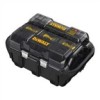Dewalt DCB116 Instruction Manual - Page 8
Locking charger Fig. 1, SAVE THESE INSTRUCTIONS, FOR FUTURE USE, Repairs, Register Online, Storage
 |
View all Dewalt DCB116 manuals
Add to My Manuals
Save this manual to your list of manuals |
Page 8 highlights
English NOT CONTINUE to use under these conditions. Follow the charging procedure. You may also charge a partially used pack whenever you desire with no adverse affect on the battery pack. 5. Foreign materials of a conductive nature such as, but not limited to, grinding dust, metal chips, steel wool, aluminum foil, or any buildup of metallic particles should be kept away from charger cavities. Always unplug the charger from the power supply when there is no battery pack in the cavity. Unplug charger before attempting to clean. 6. Do not freeze or immerse charger in water or any other liquid. WARNING: Shock hazard. Don't allow any liquid to get inside charger. Electric shock may result. CAUTION: Burn hazard. Do not submerge the battery pack in any liquid or allow any liquid to enter the battery pack. Never attempt to open the battery pack for any reason. If the plastic housing of the battery pack breaks or cracks, return to a service center for recycling. Storage Recommendations 1. The best storage place is one that is cool and dry away from direct sunlight and excess heat or cold. 2. For long storage, it is recommended to store a fully charged battery pack in a cool dry place out of the charger for optimal results. NOTE: Battery packs should not be stored completely depleted of charge. The battery pack will need to be recharged before use. Cord Storage (Fig. 1) There are two pegs (h) on the side of the charger that act as a cord wrap for safe storage of the cord when the charger is not in use.Simply wrap the cord around the outside of both pegs and tuck the end of the cord into itself so it won't come undone. Locking charger (Fig. 1) Your charger gives you the ability to lock it to keep your batteries secure. Close the lid (a) and fasten the locking latches (b), slide a lock through the lock hole (g), and secure the lock. SAVE THESE INSTRUCTIONS FOR FUTURE USE Repairs The charger and battery pack are not serviceable. There are no serviceable parts inside the charger or battery pack. READ ALL OF THE INSTRUCTIONS IN THE BATTERY CHARGER SECTION OF THIS MANUAL BEFORE ATTEMPTING TO CHARGE THE BATTERY PACK FOR YOUR TOOL. To assure product SAFETY and RELIABILITY, repairs, maintenance and adjustment should be performed by certified service centers or other qualified service organizations, always using identical replacement parts. Register Online Thank you for your purchase. Register your product now for: • WARRANTY SERVICE: Registering your product will help you obtain more efficient warranty service in case there is a problem with your product. • CONFIRMATION OF OWNERSHIP: In case of an insurance loss, such as fire, flood or theft, your registration of ownership will serve as your proof of purchase. • FOR YOUR SAFETY: Registering your product will allow us to contact you in the unlikely event a safety notification is required under the Federal Consumer Safety Act. Register online at www.dewalt.com/register. 6















